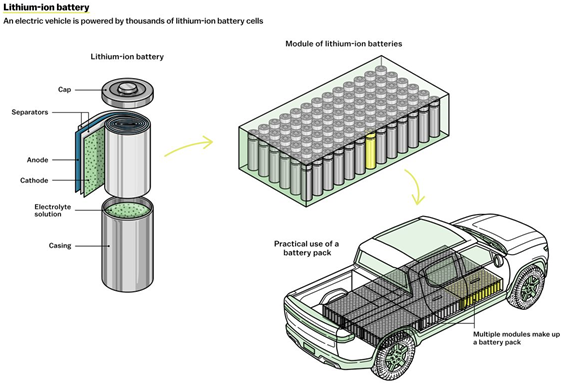Context
The Bureau of Indian Standards (BIS), the central standards setting agency under the Consumer Affairs Ministry of the Government of India, has formulated minimum performance standards required for electric vehicles in India.
Background
- Safety of electric vehicles, particularly electric two-wheelers, has become a major concern because of recurring incidents of fire in EVs. Brands like Ola Electric, Okinawa Autotech, Pure EV and Jitendra EV were all involved in fires of electric two-wheelers.
Key-highlights of the Standards
- BIS has published standards for test specifications for Lithium-ion Traction Battery Packs and Systems (performance testing) for Electrically Propelled Road Vehicles.
- The standard IS 17855: 2022 for these battery packs and systems is harmonized with ISO 12405-4: 2018.
|
A battery is a device that converts chemical energy into electric energy by means of an electrochemical reaction.
|
- The standards incorporates the test procedure for the basic characteristic of performance, reliability and electrical functionality for the battery packs and system for either high power or high energy application.
- The standard of EV batteries have been formulated based on several real world scenarios which also include operating batteries at low or high temperatures.
- The tests also involve battery performance when not in use for a long time, or when being shipped or stored.
- Apart from the new guidelines, the BIS is also expected to come out with two more standards related to batteries for various passenger and goods carrying vehicles in the coming days.
Type of EV Batteries
- Electric vehicles are powered by battery electric power. Different types of batteries are available in the market. They include:
- Lithium-Ion batteries
- Solid state batteries
- Nickel-Metal Hydride Batteries
- Lead-Acid Batteries
- Ultracapacitors
- However, Lithium-ion batteries are the most efficient and preferred.
What is a ‘Lithium-ion battery’?
- A Lithium-ion (Li-ion) battery is a type of rechargeable battery used in electric vehicles and a number of portable electronics.
- They have a higher energy density than typical lead-acid or nickel-cadmium rechargeable batteries.
- This means that battery manufacturers can save space, reducing the overall size of the battery pack.

Do you know?
Lithium is also the lightest of all metals. However, lithium-ion (Li-ion) batteries contain no lithium metal, they contain ions.
- Ion: An ion is an atom or molecule with an electric charge caused by the loss or gain of one or more electrons.
|
